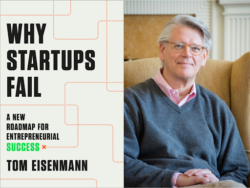What Founders Need to Learn, If They Didn’t Go to B-School
Here’s a clip of my podcast interview with Prof. Tom Eisenmann of Harvard Business School’s Arthur Rock Center for Entrepreneurship, author of Why Startups Fail. Aired in June on Startup Confidential – the interview is available on all major podcast platforms.
Believe it or not, founders with prior business operating experience DO tend to outperform their newbie peers, at least initially. But, it doesn’t seem correlated strictly to reaching scale or surviving long-term.
If you’re reading this, odds are above average that you don’t have a traditional MBA. You may have business experience prior to founding your company. Or not.
The advantage that MBAs have is not talent; they receive training in ALL the components of business administration. They at least know what all the buckets are. Many consumer-brand founders do not have this basic knowledge.
Some have only stereotyped views of marketing or sales or manufacturing.
Some have little preview to rigorously manage cash flow and working capital to get to an initial viable scale in consumer-packaged goods with high, initial fixed costs, especially for that large initial co-man run.
Others have no clue that MOST of their day will be dealing with fires of an operational nature, not the sexy reality of ‘pitching,’ ‘promoting,’ or coming up with the original idea.
As Prof. Eisenmann says, “There’s a lot of stuff to learn, and every entrepreneur has to pick it up somehow. Drew Houston, founder of Dropbox, was an MIT computer science graduate who realized early that to scale the business, he would have to learn about something sales. Something called marketing. So, he went to Amazon and did a search: what are the Top 10 books on marketing, Top 10 books on sales.
Take Drew’s lead and read, read, read. Study up on the functions you don’t know so that you have enough of a command to ask the right questions and evaluate new hires appropriately. You can always read to fill in your gaps.” And at least “having co-founders who complement one another in terms of business function knowledge or at least affinity” is another smart move.
